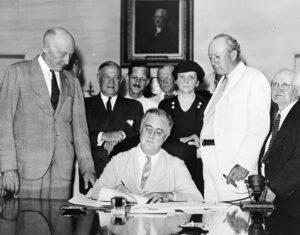Secretary of the Interior Sally Jewell designated the Frances Perkins Homestead National Historic Landmark on August 25, 2014. Sarah Peskin, Center board member and nomination author, presented it to the National Park Service and its Advisory Board, making the case for the site to join those receiving the nation’s highest honor for privately-owned historic places. Today some 2,500 historic places bear this distinction, representing the most important 3% of properties listed in the National Register of Historic Places.
Michael Chaney said “We were pleased to receive over 20 fine support letters for this designation from local, state and national individuals and organizations including the Newcastle board of selectmen, presidents of Mount Holyoke College, Maine Preservation and Historic New England, and many others.
In supporting the Center’s nomination, Earle G. Shettleworth, Jr., Director of the Maine Historic Preservation Commission, has stated, “Occupied for over 260 years by members of the Perkins family, this salt-water farm is significant for its architecture, its archaeological sites, and its agricultural landscape. But more importantly, it was the property that Frances Perkins, first female member of a President’s cabinet, considered her life-long home.”
Perkins biographer Kirstin Downey noted, “The Brick House was not just a refuge. It played a key role in shaping Frances Perkins’s substantive policies. Her undying belief in America’s greatness and goodness were rooted in her concept of what makes America unique—and these views were formed at and by that home in Maine.”
Listed in the National Register since 2009, the Perkins Homestead is nationally significant as the ancestral home of Frances Perkins, U.S. Secretary of Labor from 1933-45 and first woman to serve in a presidential cabinet. Perkins was the principal architect behind many of the New Deal policies undertaken to combat the Great Depression and improve the lives and working conditions for generations of Americans. Among her many accomplishments in a long and productive career, she is credited with establishing Social Security, standardizing the forty-hour work week, banning child labor and developing the nation’s unemployment insurance and worker compensation systems.




